|
For the western fans out there, see if any of these components ring a bell:
- A skilled gunfighter with a mysterious past that he has tried to put behind him
- A young greenhorn who is keen to learn and who becomes the gunfighter’s disciple
- A greedy cattle baron whose plans threaten the livelihood of the neighbouring farmers
- A sadistic gunslinger who works for the cattle baron and with whom the hero has had some past conflict
- A cowboy with a hatred of barbed wire
- A lead character who turns his back on a conflict, but then reverses course after taking a vicious and humiliating beating
- A rousing theme song sung by Frankie Laine
If the first words that popped into your head when you read that last one were, “He rode a blazing saddle, he wore a shining star…” then you’ll love the song that accompanies the opening titles of King Vidor’s 1955 western, Man Without a Star. It’s the very sort of tune that the main theme of Mel Brooks’ 1974 comedy masterpiece Blazing Saddles was designed to parody – the fact that both were sung by Laine himself is the cherry on the later film’s comedy cake. And yes, those other bullet-pointed components are also present in Vidor’s film, but they don’t all play out in the expected manner.
As the film opens, Dempsey Rae (Kirk Douglas) is hitching an unofficial ride in a railroad boxcar with only his saddle to his name. When the train stops for water and another stowaway, young Jeff Jimson (William Campbell), is booted off and threatened by the brakeman (Lee Roberts), a fight breaks out between them that leaves Jeff dangerously slumped across the rail. Before the train pulls away and cuts him in two, Dempsey jumps off, picks him up, and throws him into the car in which he is riding. “When you throw a punch,” Dempsey tells him, “Don’t turn your back.” During the course of the journey, the two get to know each other a little, but continue to lay low even when they see the brakeman murdered by another boxcar rider, played by an uncredited Jack Elam.
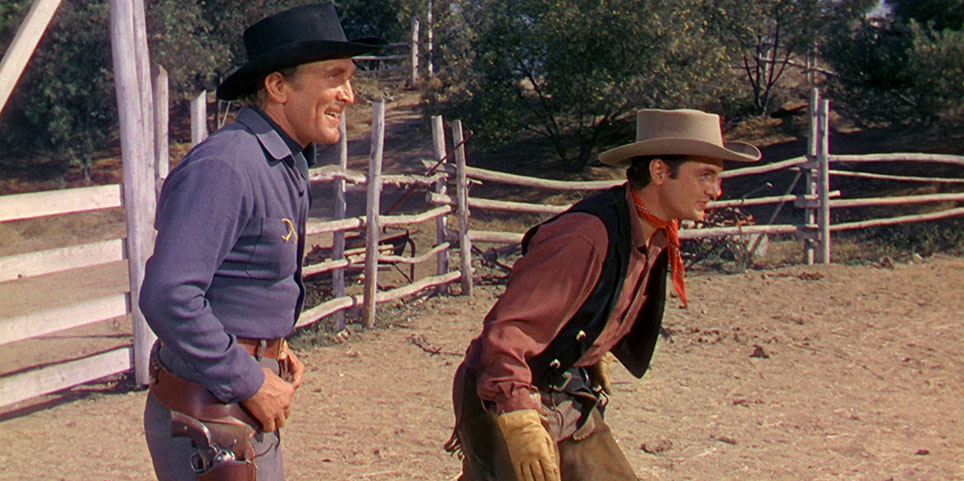
When the train reaches its destination, all of the stowaways are rounded up, and Jeff’s earlier fight with the brakeman sees him blamed for his murder, but reluctant to identify the real killer. When he learns that there is a $100 reward for his capture, Dempsey has no such qualms and promptly turns the man in, then has to use his saddle and his quick wits to dodge the knife that is then angrily thrown in his direction. With the murderer apprehended, Sheriff Olson (Roy Barcroft) tells the rest of the boxcar riders to either get jobs or get out of town, but does agree to give half of the reward money to Dempsey. When Olson departs, his unpleasant deputy, Tom Carter (George Wallace), tells Dempsey to forget about the money and leave town, something he clearly has no intention of doing.
Once in town, Dempsey calls on his old pal, Idonee (Claire Trevor), and although it’s never overtly stated (this was 1955 after all), her profession is not exactly hard to guess, and may even be at the root of her friendship with Dempsey. He immediately borrows $25 from her in order to pay Jeff his half of the promised reward and send him on his way. Idonee gets Dempsey cleaned up and hands him one of the gun belts that have been left by her cowboy customers in lieu of payment, and the confident and almost automatic manner in which he checks the gun says a lot about his past experience with such firearms. In the downstairs saloon, she introduces him to Strap Davis (Jay C. Flippen), the foreman at a big local spread known as The Triangle, whose 10,000 head of cattle are leaving little grazing ground for the district’s smaller ranges. The smallholders hold no grudge against the affable Strap but do wonder why The Triangle’s new owner has not yet shown his face. He’s coming as soon as the ranch house has been rebuilt, Strap assures them, and to Idonee and Dempsey’s astonishment, reveals that this building has a bathroom inside the house. “Well, that ain’t decent,” remarks Idonee. “Only someone from the East would think of that.” You just know that the film is going to get more mileage from this.
It's here the film undergoes the first of its unexpected tonal shifts, as Jeff walks in dressed in newly purchased duds that come perilously close to a novelty cowhand outfit, and the hitherto easy-going mood of the scene moves into the realms of character comedy. The costume prompts some wildly comical piss-taking from Dempsey, to whom Idonee then hands a banjo, which he immediately and cheerfully sets about playing, reviving memories of the actor’s musical interlude in the previous year’s 20,000 Leagues Under the Sea. While he’s strumming away, Tom Carter ambles in and demands to know why Jeff has not left town, and in the argument that ensues, the hot-headed but unarmed Jeff punches Carter to the floor. When the deputy reaches for his gun, Dempsey steps in, and the resulting stand-off between him and Carter looks set to explode into a duel that will likely see one of them injured or killed. It’s a revealing moment, as while it is ultimately diffused by the timely arrival of Sheriff Olson, the threat that Dempsey represents is visible not just in his expression, his choice of words and tone of voice, but in Carter’s clear reluctance to draw against him. When Olson demands to know what’s going on, Idonee angrily condemns Carter’s actions and the ranchers assure Olson that she’s telling the truth. “I know,” Olson responds, “It’s a habit of hers,” another potentially intriguing backstory that is explored no further. Olson then hands Dempsey his reward money and tells him that needs to leave town if he doesn’t have a job, to which Strap calmly responds, “He’s got one.” It’s Dempsey’s Texas background and experience as a cattle roper rather than his readiness with a gun that are behind this offer, but when Jeff tries hopelessly to claim a similar history, it takes Dempsey’s declaration that the two are partners to also secure him a position.
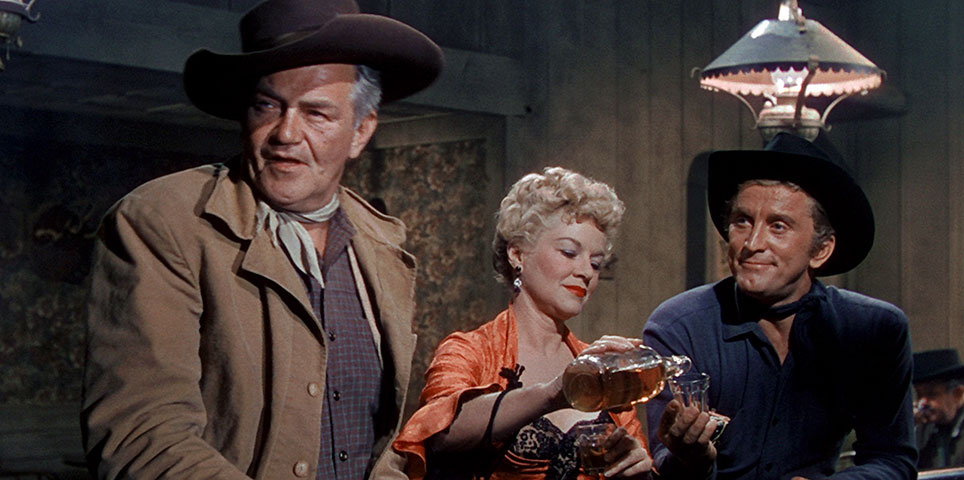
It's once Dempsey and Jeff are working at The Triangle that Vidor and screenwriters Borden Chase and D.D. Beauchamp (loosely adapted from Dee Linford’s novel) begin really playing games with expectations and formula, and even pushing a couple of genre boundaries. The first big surprise comes with the arrival of the mysterious new owner of The Triangle, as despite Strap’s earlier assurance to the ranchers that, “He’s coming as soon as the house is complete,” the “he” in question turns out to be a she, albeit one with the non-gender specific name of Reed Bowman (Jeanne Crain). And of course, she’s as attractive as hell, enough to have Dempsey on the verge of drooling and tripping over himself to make an impression, but she’s clearly used to handling the likes of him and initially gives him the cold shoulder. That fails to dissuade the lustful Dempsey in the least, and when Reed invites Strap and his top hand Latigo (Sheb Wooley) to join her for dinner, Dempsey offers himself up as a replacement for Latigo after knocking him cold when a fight breaks out between them. Surprisingly – well, perhaps not – Reed accepts. It’s at this meal that Reed reveals herself to be a mercenary capitalist who cares little about the welfare of the neighbouring ranchers or their smaller livestock herds, news that is coolly received by the decent-minded Strap but which doesn’t faze the ambitious Dempsey in the slightest. After the unhappy Strap leaves, Dempsey really tries it on with Reed, and while she initially seems to go along with his advances, it quickly becomes clear that to her he's little more than a tool she can manipulate to achieve her greed-driven goals. She’s given a later boost on this score when another 5,000 head of cattle are driven up from Texas by a team led by Steve Miles (Richard Boone), the mention of whose name instantly rankles Dempsey, and while their past history together is never specified, from the moment they meet up it’s clear that there is no love lost between them.
Things further deviate from the expected norm (and there are some spoilers ahead, so hop to the next paragraph click here to avoid them) when Dempsey calls at the house again later, Reed encourages him to seek her out in the bathroom in which she bathing. When Dempsey sticks his head around the bathroom door, he is startled by the sight that greets him, but Reed isn’t embarrassed in the least. She invites him to wait in the adjacent bedroom, and while it’s never explicitly stated, it’s clearly intimated that the two then sleep together. Well, not sleep, if you know what I mean. What really intrigues about this assignation is that both parties are shown to be using it for their own selfish ends. Reed has sex with Dempsey as the price she knows she has to pay for him to stay on as her new foreman, something that the fully aware Dempsey uses to get his end away just once with a woman he physically desires but has no intention of continuing to work for. He then quits his post and heads into town, only to be unexpectedly replaced by Jeff after he becomes ticked off at Dempsey for paying more attention to Reed than him. At least that’s how I read it. A barroom gunfight between Dempsey and Miles is unexpectedly averted when Idonee – who is far and away the strongest, most honest and most caring character in the story – shoves a banjo in his hand, which prompts another of those instantaneous tonal shifts, as Dempsey breaks into a smile and sings a jolly song that diffuses the tension and gently mocks Reed and Jeff, who have seemingly come to the bar specifically to wind him up. Even later, when he takes a beating from Miles and his crew, he is not transformed into a lethal avenger in the manner the Man With No Name in the later A Fistful of Dollars, and instead puts his very personal hatred of barbed wire on hold to help the smallholders erect fences necessary to keep The Triangle’s cattle from gobbling up all of their grazing land.
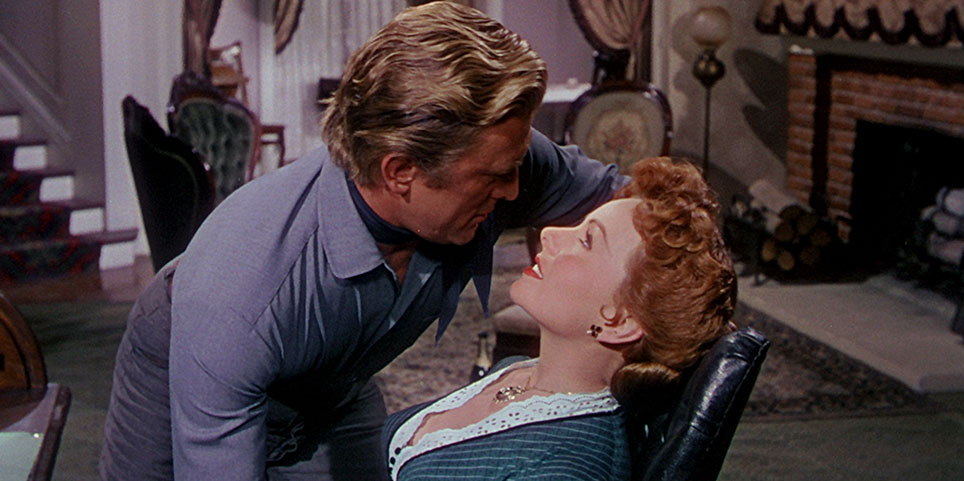
Made midway through a decade that saw the content, character arcs and cinematic style of the genre taken in new directions, Man Without a Star has the feel of a traditionalist western in the early throes of modernisation. It’s noted in the special features that director Vidor lacked enthusiasm for the project, and that co-screenwriter Borden Chase – whose past genre credits include Red River for Howard Hawks, Winchester ’73 (1950), Bend of the River (1952) and The Far Country (1954) for Anthony Mann, and the story for Robert Aldrich’s Vera Cruz (1954) – was likely the driving force behind the film’s more revisionist elements and the sometimes significant changes made to Dee Linford’s source novel. Certainly the decision to change the gender of cattle baron from male to female brings a fascinating sexual dynamic to the film that sets it apart from a good many of its contemporaries. Of course, were such a change implemented today, it would probably have right-wing commentators howling at the moon and claiming that the filmmakers had gone ‘woke’, for pity’s sake.
Particularly intriguing is how little is revealed about Dempsey’s past, with small clues dropped instead that are seemingly designed to encourage speculation on our part. That he arrives in the town without a horse or a gun when he’s clearly used to owning both seem initially to be a matter of experience-shaped practicality – the long journey he’s taking is too-punishing a ride and being armed might potentially count against him should he be caught riding the train by lawmen. Yet his quick willingness to identify the man who murdered the brakeman when he learns there is a reward for his capture, coupled with his quick search for gainful employment, suggests that he likely lost both due to poverty or misfortune – had he sold such possessions, he wouldn’t have arrived in town without a penny to his name. We learn that he is a crack shot when he teaches Jeff the basics of drawing and shooting, and when he challenges Cassidy to a barroom duel, everything about his demeanour suggests that this is far from the first time he has made such a move, and that he knows full well that it’s a fight he can easily win. Perhaps the most telling moment of all comes late in the film (small spoilers ahead – hop to the next paragraph to avoid), when he and Jeff have fallen out and Jeff lands a punch on him, and Dempsey responds by instantly pulling his gun on Jeff, a look of absolute, murderous fury on his face. What terrible incident in his past could trigger such an extreme and instantaneous reaction? We’re also left to guess exactly how he got the terrible body scars that filled him with such hatred not just for barbed wire, but for anyone who uses it, no matter how genial they are towards him. And I can’t be the only one who wonders about the true meaning of the film’s title. Given that in westerns the word star almost always refers to a sheriff’s badge of office, it may be suggesting that Dempsey acts like a sheriff in an unofficial capacity when he later makes a stand against injustice and greed. Yet perhaps it’s a reference to Dempsey’s past life as a lawman, a position he was forced to abandon – stripped pf his gun, his horse and his badge – for reasons I could happily waste a couple of paragraphs fancifully conjecturing about. Then again, the trailer suggests that he's a drifter with no star to guide him, but I'm calling promotional bullshit on that.
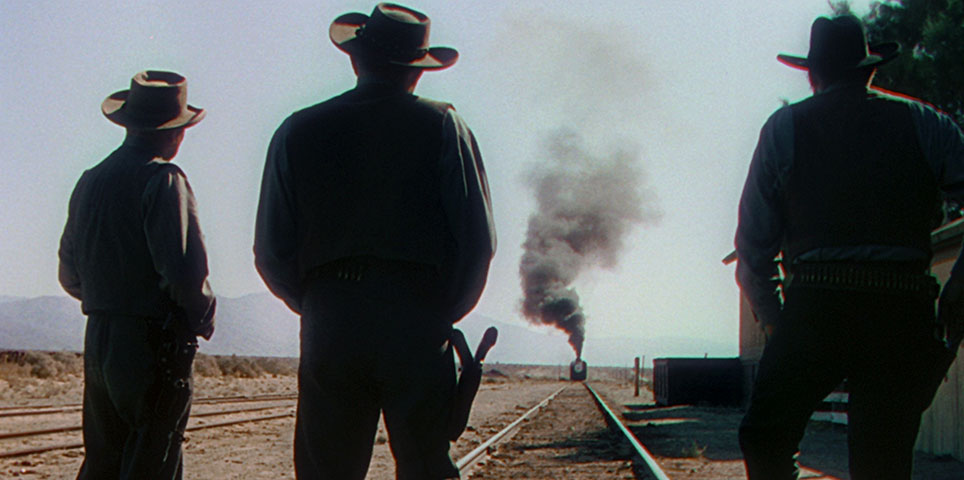
Man Without a Star may be less adventurous than many of the notable westerns of the era, but it’s still an entertaining work with some noteworthy elements, not least its surprisingly forward attitude to sexuality. That said, in the battle between the traditional and the revisionist, traditionalism ultimately wins, right down to an ending that nowadays would be regarded as a western cliché, albeit one that us genre fans still have a genuine affection for. A solid script gets professional and sometimes slyly stylish handling from Vidor and cinematographer Russell Metty, notably in an early shot of Sheriff Olson and his men waiting for the train on which Dempsey and Jeff are riding, whose framing echoes imagery from Fred Zinnemann’s High Noon (1952) and anticipates (and perhaps influenced?) the extraordinary opening sequence of Sergio Leone’s Once Upon a Time in the West (1968). Vidor also impresses in his handling of violence, which is sharp, brutal and pleasingly unglamorous, and is ultimately comes across as something to be avoided if there is any reasonable alternative. A strong supporting cast really helps here – I particularly liked Claire Trevor’s no-nonsense Idonee – but the film ultimately shapes up as a star vehicle for the ever-reliable Kirk Douglas. His exaggerated comic reactions do play to the gallery somewhat, but he really shines when wrestling with tortured emotions, quietly communicating the threat he represents, or exploding with potentially dangerous anger. He also demonstrates a genuinely astonishing skill for exhibition handgun twirling, pulling off a string of fancy moves for the astonished Jeff. Whether this was a skill that Douglas already possessed or one he learned specifically for the film is unclear, but if it was the latter, I have to salute the work it must have taken, particularly given that he then undercuts his efforts with the punchline, “That’s all a lot of hogwash, kid. Twirling a gun never saved a man’s life.”
Framed in the film’s original aspect ratio of 2.0:1, this is a sprightly 1080p transfer that is clearly the result of a restoration or HD remaster, the specifics of which I’ve not been able to track down. Either way, the film looks damned fine here, handsomely showcasing Russell Metty’s Technicolor cinematography, with well-balanced contrast, clearly-defined detail and vibrant colour. A few minor instances of dust and dirt remain, and at one point I spotted a small piece of what looked like chemical damage, but this only lasts a couple of seconds and is not a major distraction. A fine film grain is clearly visible, and the image is very stable within frame.
The Linear PCM 2.0 mono soundtrack has the expected range restrictions but is otherwise reproduces the dialogue, effects and music clearly, especially Frankie Laine’s heartily sung title song. There are no obvious signs of damage or wear.
Optional English subtitles for the deaf and hearing impaired are available, pardner.
Audio Commentary by Kim Newman and Barry Forshaw
It’s getting to the point where author and critic Kim Newman is featured on so many commentaries that I’m wondering how he finds time to do any writing – not that I’m complaining, as he and fellow writer and western expert Barry Forshaw always deliver the goods, and that’s certainly the case here. Subjects discussed in enthusiastic detail include director King Vidor, leading man Kirk Douglas, key members of the supporting cast, the notion of a film about avoiding violence that has many violent moments, screenwriter Gordon Chase, the enduring nature of the western, James Goldstone’s 1968 remake A Man Called Gannon, and much more. Handily, Newman is familiar with Dee Linford’s novel and is thus able to discuss the many differences between the film and its source material, and he sums up the feeling of both men when he describes the film as no masterpiece, but a solid and interesting one nonetheless.
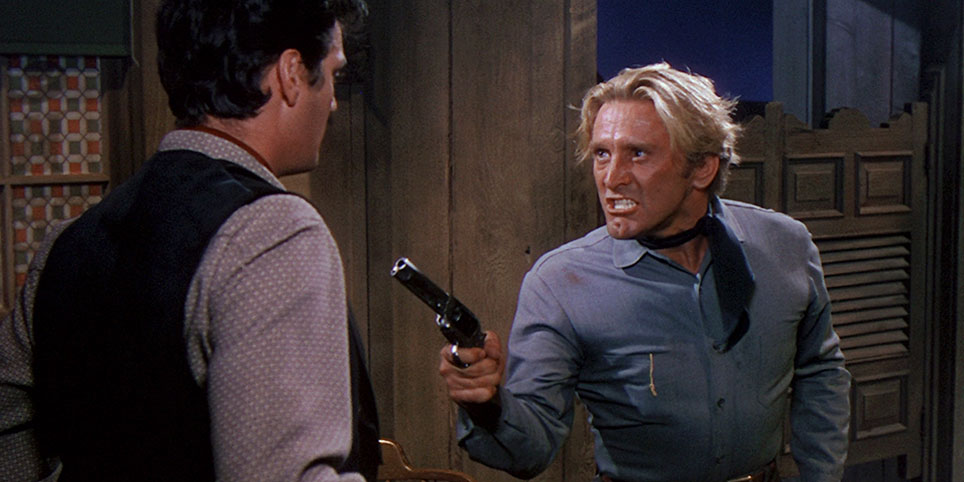
Neil Sinyard on Man Without a Star (18:04)
Film scholar Neil Sinyard offers his thoughts on what he describes up front as “a rather interesting and eccentric western,” noting that it has elements both traditional and modern, and setting it in the context of other, genuinely genre-changing works of the period. He opines that the three main driving forces behind the film – Kirk Douglas, director King Vidor, and screenwriter Gordon Chase – were not always pulling in the same direction, and that it takes half-an-hour to get to the main story, but also praises its strengths, including its brisk pace and its unusually forthright sexuality.
Trailer (0:59)
A short, Academy-framed trailer that makes a big deal of the fact that Frankie Laine sings the theme song, and whose narrator gets on the hyperbole train by claiming of Dempsey, "His only law was his gun, his only love the wild, free range, until wanton kisses tempted him into the strangest bargain any man ever made with a woman." Oh, do you reckon?
Also included is a Collector's Booklet featuring a new essay on the film by film writer Rich Johnson, and a new piece by critic Richard Combs about the Western films of King Vidor, but this was not available for review.
The consensus in the on-disc special features seems to be that while Man Without a Star is no classic, it’s still a consistently interesting film, and it’s hard to disagree. It’s certainly entertaining, and the odd tension between the traditional and more modern elements make it a less predictable watch than the early scenes might lead you to expect. A solid transfer and a couple of excellent special features make this a worthy buy for fans of this enduring and influential genre.
|